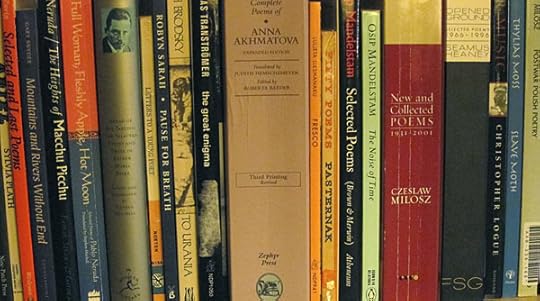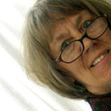A Deficit of Consonants
Poems - a lot of poems - come across this virtual desk. Some I need to read with extreme attention, because my advice or input or decision is needed; some, often written by friends, feel like gifts during my day. Others - the majority - are part of the large volume of words that pass in front of my eyes, sifting and tossing but eventually falling like bits of colored paper drifting from skyscraper windows during a parade. My words, too, are part of that constant fluttering: some catching the light for a brief moment before coming to their own rest, lost among so many others.
Today, unaware, I read a poem that utterly devastated me. It wasn't a good poem. It simply sliced me, the way a sheet of paper turns into a thin, efficient blade and cuts the side of a finger.
A friend quotes W.S. Merwin, in conversation with Bill Moyers:
"I think poetry's about what can't be said. And I think that language emerges out of what could not be said. Out of this desperate desire to utter something, to express something inexpressible. Probably grief. Maybe something else. You know, you see a silent photograph of an Iraqi woman whose husband or son or brother has just been killed by an explosion. And you know that if you could hear, you would be hearing one long vowel of grief. Just senseless, meaningless vowel of grief. And that's the beginning of language right there.
Inexpressible sound. And it's antisocial. It's destructive. It's utterly painful beyond expression. And the consonants are the attempts to break it, to control it, to do something with it. And I think that's how language emerged."
Poetry is about what's can't be said: yes, often true. And we need poetry, art, music to try to express the rawness of our pain more often, I think, than our joy. We enter the realm of art full of emotion, need, and desire, wanting to say something about ourselves, about existence, about what has happened to us or what we've seen happening to others.
But if poetry is the language that emerges from inexpressible sound, we must learn that handling words is like handling knives. Becoming masterful often means saying less, or coming at the subject obliquely: the slant light of late afternoon picking out one falling shred of paper and setting it aflame during its flight to earth. Becoming a master of oneself as well as the words.
The amateur and the egotist, however, say everything. Their work has the capacity - perhaps even the intent - to violate rather than move us, like the graphic news photograph on the front page that can now never be erased from our mind.
It was safer, perhaps, before the internet gave everyone a platform from which to dump their buckets of vowels.




